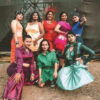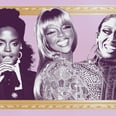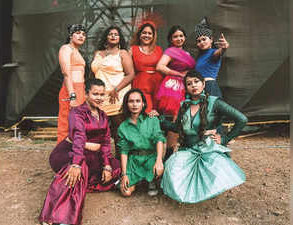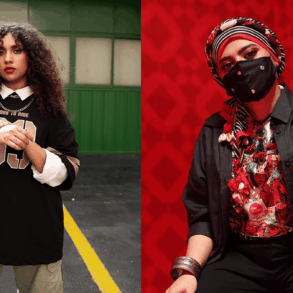Since hip-hop’s inception, the culture has been a male-dominated space. Women have had to fight for their right to exist alongside their male peers, exercise autonomy over their bodies, and rap without restrictions. It’s no secret that the culture of hip-hop is inherently fueled by misogyny and patriarchy; female rappers have been ostracized, while their male counterparts stand to gain. But in recent years, an influx of women rappers have emerged, ushering in a resurgence of sexually explicit lyrics that have jolted mainstream music, social media, and even politics. Yes, women in music have always talked about their sexual prowess; women rappers are simply continuing a long and strong tradition of Black women loudly reclaiming their own sexuality, most notably under the umbrella of “pussy rap.”
For hip-hop’s 50th anniversary, it’s important to honor those who gave rise to and continued to iterate on the subgenre — one of the most visible manifestations of this longer legacy of Black women artists defying harmful stereotypes. Despite sexist and racist backlash to this music, these hip-hop artists will continue to liberate other women with their explicit, honest, and radical raps.
“Women rappers are simply continuing a long and strong tradition of Black women loudly reclaiming their own sexuality.”
Much like hip-hop, the blues was male-dominated and cultivated the earliest forms of sex-filled songs with a subgenre known as “dirty blues,” which oftentimes objectified women. Due to the obscene nature of the genre, those songs rarely made it to radio and were mostly played on jukeboxes. In 1924, blues singer Ma Rainey recorded “Shave ‘Em Dry,” perfectly pairing her dynamic vocals with sexually-tinged words. Her record spawned various versions, including Lucille Bogan’s track, which is easily one of the most titillating blues songs in history. “I got nipples on my titties big as the end of my thumb. I got somethin’ between my legs that’ll make a dead man cum,” the record opens. Throughout the 1930s, Bogan continued to confront topics of sex unabashedly, releasing sonically salacious tracks like “Til The Cows Come Home” and “Tricks Ain’t Walkin’ No More,” in which she told stories about sexual acts with her partner and and her experiences as a sex worker.
At a time where racism and sexism threatened the safety and autonomy of Black women, female blues singers loudly reclaimed their sexuality. As Angela Davis writes in “Blues Legacies and Black Feminism,” “Sexuality was one of the few realms in which masses of African-American women could exercise autonomy—and thus tangibly distinguish their contemporary status from the history of enslavement.”
As Black music genres evolved through the decades, women artists persisted in divesting from objectification and mammification, asserting their social, economical, and political freedom. In the ’70s, Millie Jackson and Betty Davis led the charge on innuendo-laden tracks with “The Rap” and “Your Man My Man,” where they defied the notion that “this is a man’s world” and instead celebrated objectifying men against soulful, bass-packed beats. Then, in the ’80s and ’90s, Salt-N-Pepa would get very frank with their sexually suggestive songs, including their famous sex-positive anthem, “Let’s Talk About Sex.”
In November 1996, though, two women from Brooklyn would change mainstream hip-hop forever, putting pussy on a pedestal literally and figuratively. Just four days apart, Lil’ Kim and Foxy Brown released their debut albums, “Hard Core” and “Ill Na Na,” debuting on the Billboard 200 charts at No. 11 and No. 7, respectively. According to hip-hop historian and author Dart Adams, the nature by which they divulged their sexual pleasures and desires first gave rise to the term pussy rap — though back then, it was mostly used by disapproving men. Nevertheless, their braggadocious bars incited a raunchy renaissance in the likes of Gangsta Boo, Missy Elliott, Trina and Khia, subsequently cementing the subgenre pussy rap in the history of hip-hop.
“Two women from Brooklyn would change mainstream hip-hop forever, putting pussy on a pedestal literally and figuratively.”
Despite male rappers using women’s sexuality as a vehicle for success and frequently churning out songs overwhelmingly plagued with drug use and violent bars, it’s female rappers who remain overly scrutinized for their lyrical content, especially when it comes to talking about pussy. Lil’ Kim and Brown’s achievements came with much condemnation and lewd remarks. In a 1997 PAPER interview with the late bell hooks, Lil’ Kim shared her thoughts on being simultaneously lauded as an example of sexy feminism, being called a hoe, and condemned for setting back women’s liberation. “We have people like Too Short, Luke Skyywalker [of 2 Live Crew], Biggie [Smalls], Elvis Presley, Prince, who are very, very, very sexual, and they don’t get trashed because they like to do it. But all of a sudden, we have a female who happens to be a rapper, like me, and my doin’ it is wrong,” she explained. “And ’cause I like doin’ it, it’s even more wrong because we’ve fought for years as women to do the same things that men are doing.”
The late 2010s gave rise to a new onset of female rappers, including Cardi B, Megan Thee Stallion, Doja Cat, Latto, and City Girls, who were all proud to talk about what they could do sexually and called for men to play with their pussy and not their emotions. Despite these liberated revelations and beats, they were still met with critique.
In 2019, producer Jermaine Dupri shared his controversial comments about the stripper-to-rapper pipeline, saying, “I’m getting like, ‘Oh, you got a story about you dancing in the club. You got a story about you dancing in the club. You got a story about you dancing in the club’…OK, all right, who’s gonna be the rapper?” Coming off of an era where Nicki Minaj was highly regarded — whether she was going bar for bar with Kanye West, JAY-Z, and Rick Ross on the “Monster (Remix),” or interpolating Sir-Mix-A-Lot’s “Baby Got Back” on “Anaconda” — Dupri served up nothing more than a moot point. And he wouldn’t be the last to chime in.
In August of 2020, Cardi B and Megan Thee Stallion dubbed themselves the poster girls for wetness with their slippery, eargasmic single “WAP.” Joining their lubricious punchlines for the ultimate pussy-powered anthem, the pair drew commentary from every part of the world, including politicians who insisted on using women’s bodies as political pawns. In spite of hip-hop’s history with oversexualization, the ramifications for those who dare to lean into sexual expression in their music has exclusively been reserved for women, and there’s no indication that it will change anytime soon.
But a new wave of female rappers — including Ice Spice, GloRilla, and Lola Brooke — are clear about their stance: they aren’t waiting. Following the blueprint set forth by their uncensored matriarchs, they’re unapologetically calling men munches, ridding themselves of f*ckbois, and sending warnings not to play it — proving that when it comes to hip-hop, pussy will always prevail.
This post was originally published on this site be sure to check out more of their content.







